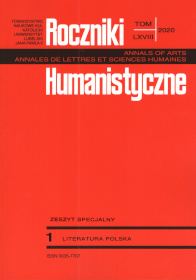Karol Wojtyła – teatr osoby
Karol Wojtyła – the Theatre of the Person
Author(s): Wojciech KaczmarekSubject(s): Theatre, Dance, Performing Arts, Language and Literature Studies, Fine Arts / Performing Arts, Studies of Literature, Polish Literature
Published by: Towarzystwo Naukowe KUL & Katolicki Uniwersytet Lubelski Jana Pawła II
Keywords: person; personalism; Thomism; phenomenology; Theatrum Dei
Summary/Abstract: According to Karol Wojtyła’s personalism, a person is both a subject and a relationship. A person is a relational being whose body predisposes him or her to engage in dialogue. The meeting of people, and their relationships as a result of this event, lie at the core of theatre. In his personalistic theatre, Wojtyła created a bridge between Thomism and Phenomenology, exploring the human person as an actor. In Our God’s Brother (Brat naszego Boga, 1945–1950), Wojtyła attempts to “penetrate man,” so as to be able to arrive at the sources of his humanity. What allows one to penetrate man’s nature is the revelation of the relationship between his “I,” understood as the subject which comes to know, and the “you” of the other, recognised in personal experience as a second “I.” The originality of Wojtyła’s drama is contained in its literary and theatrical nature, but its full sense is only revealed in the perspective of Theatrum Dei (especially in Wojtyła’s dramatic trilogy: Our God’s Brother – Brat naszego Boga; In front of the Jeweller’s Shop – Przed sklepem jubilera, 1960; The Radiance of Fatherhood – Promieniowanie ojcostwa, 1967). We could call Wojtyła’s drama of the inner Self the Theatre of the Person.
Journal: Roczniki Humanistyczne
- Issue Year: 68/2020
- Issue No: 1S
- Page Range: 123-136
- Page Count: 14
- Language: Polish

